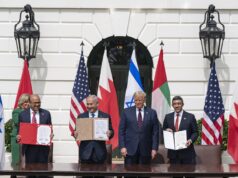The Mideast Quartet may attempt to jump-start Israeli-Palestinian peace talks by formally endorsing, for the first time, the creation of a Palestinian state if Israeli Prime Minister Benjamin Netanyahu fails to lay out his vision for restarting peace talks, according to a report in the Los Angeles Times on Tuesday. The Quartet, comprised of the U.S., EU, UN, and Russia, would support a state along the 1967 borders with East Jerusalem as its capital, the report said.
Israeli-Palestinian peace talks stalled last September. In the meantime, Palestinian Authority President Mahmoud Abbas has campaigned across the world to try and gain international support for the creation of an independent Palestinian state. Abbas plans to unilaterally seek recognition for the state at the UN this September, a plan that the United States has repeatedly rejected, holding that reaching peace through negotiations with Israel is the only way.
 That the Quartet is pressuring Israel rather than the Palestinians is nothing short of ridiculous: It is the Palestinian Authority that has been intransigent by refusing to conduct peace talks unless the Israelis impose a moratorium on settlement expansion – never before a precondition to negotiations. Moreover, has the Quartet forgotten about Hamas? Recognizing a Palestinian state in the West Bank and Gaza Strip will make no difference for the Palestinians, as Hamas has shown no signs of moderating its stance on Israel, or an interest in relinquishing control over Gaza. Indeed, the group won’t even hold an election in the Gaza Strip along with the PA.
That the Quartet is pressuring Israel rather than the Palestinians is nothing short of ridiculous: It is the Palestinian Authority that has been intransigent by refusing to conduct peace talks unless the Israelis impose a moratorium on settlement expansion – never before a precondition to negotiations. Moreover, has the Quartet forgotten about Hamas? Recognizing a Palestinian state in the West Bank and Gaza Strip will make no difference for the Palestinians, as Hamas has shown no signs of moderating its stance on Israel, or an interest in relinquishing control over Gaza. Indeed, the group won’t even hold an election in the Gaza Strip along with the PA.
Endorsing a Palestinian state along the 1967 borders at this time will only add fuel to the Palestinian leaders’ fire and give them more of a reason to refrain from negotiating a lasting peace deal with Israel. The Palestinian Authority should instead lay out its vision of a Palestinian state because it is their vision, inability to compromise, and refusal to tackle their own mythology that remains the biggest obstacle to peace.





